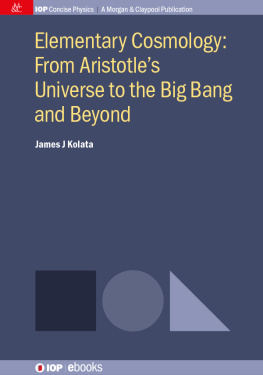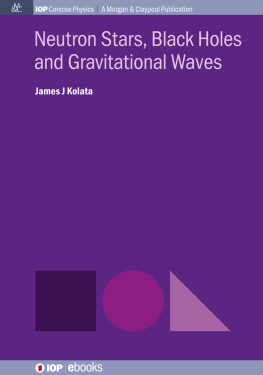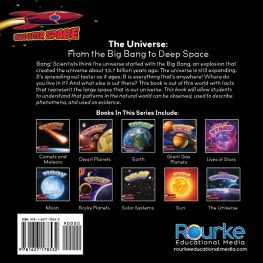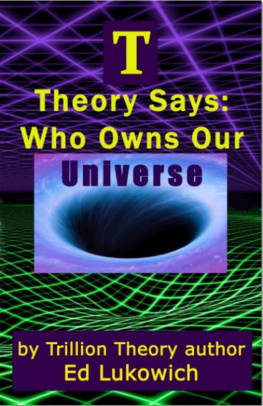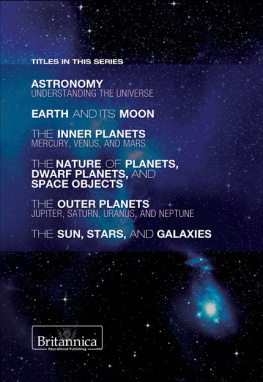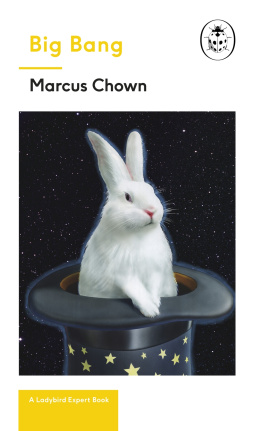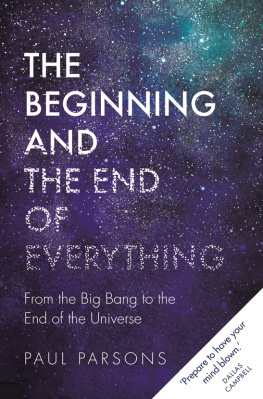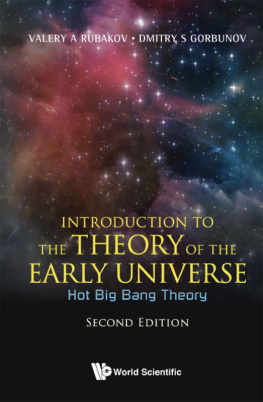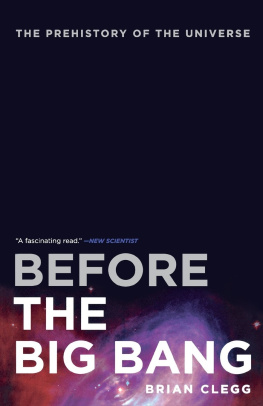James J Kolata - Elementary Cosmology: From Aristotles Universe to the Big Bang and Beyond
Here you can read online James J Kolata - Elementary Cosmology: From Aristotles Universe to the Big Bang and Beyond full text of the book (entire story) in english for free. Download pdf and epub, get meaning, cover and reviews about this ebook. year: 2015, publisher: Morgan & Claypool Publishers, genre: Children. Description of the work, (preface) as well as reviews are available. Best literature library LitArk.com created for fans of good reading and offers a wide selection of genres:
Romance novel
Science fiction
Adventure
Detective
Science
History
Home and family
Prose
Art
Politics
Computer
Non-fiction
Religion
Business
Children
Humor
Choose a favorite category and find really read worthwhile books. Enjoy immersion in the world of imagination, feel the emotions of the characters or learn something new for yourself, make an fascinating discovery.
- Book:Elementary Cosmology: From Aristotles Universe to the Big Bang and Beyond
- Author:
- Publisher:Morgan & Claypool Publishers
- Genre:
- Year:2015
- Rating:3 / 5
- Favourites:Add to favourites
- Your mark:
- 60
- 1
- 2
- 3
- 4
- 5
Elementary Cosmology: From Aristotles Universe to the Big Bang and Beyond: summary, description and annotation
We offer to read an annotation, description, summary or preface (depends on what the author of the book "Elementary Cosmology: From Aristotles Universe to the Big Bang and Beyond" wrote himself). If you haven't found the necessary information about the book — write in the comments, we will try to find it.
Elementary Cosmology: From Aristotles Universe to the Big Bang and Beyond — read online for free the complete book (whole text) full work
Below is the text of the book, divided by pages. System saving the place of the last page read, allows you to conveniently read the book "Elementary Cosmology: From Aristotles Universe to the Big Bang and Beyond" online for free, without having to search again every time where you left off. Put a bookmark, and you can go to the page where you finished reading at any time.
Font size:
Interval:
Bookmark:

Elementary Cosmology:
From Aristotles Universe to
the Big Bang and Beyond
James J Kolata
University of Notre Dame, USA
Morgan & Claypool Publishers
Copyright 2015 Morgan & Claypool Publishers
All rights reserved. No part of this publication may be reproduced, stored in a retrieval system or transmitted in any form or by any means, electronic, mechanical, photocopying, recording or otherwise, without the prior permission of the publisher, or as expressly permitted by law or under terms agreed with the appropriate rights organization. Multiple copying is permitted in accordance with the terms of licences issued by the Copyright Licensing Agency, the Copyright Clearance Centre and other reproduction rights organisations.
Certain images in this publication have been obtained by the author from the Wikipedia/Wikmedia website, where they were made available under a Creative Commons licence or stated to be in the public domain. Please see individual figure captions in this publication for details. To the extent that the law allows, IOP Publishing and Morgan & Claypool Publishers disclaim any liability that any person may suffer as a result of accessing, using or forwarding the image and permission should be sought before using or forwarding the image from Wikipedia/Wikimedia as appropriate and/or the copyright owner. https://creativecommons.org/licenses/by/3.0/
Rights & Permissions
To obtain permission to re-use copyrighted material from Morgan & Claypool Publishers, please contact .
ISBN 978-1-6817-4100-0 (ebook)
ISBN 978-1-6817-4036-2 (print)
ISBN 978-1-6817-4228-1 (mobi)
DOI 10.1088/978-1-6817-4100-0
Version: 20151101
IOP Concise Physics
ISSN 2053-2571 (online)
ISSN 2054-7307 (print)
A Morgan & Claypool publication as part of IOP Concise Physics
Published by Morgan & Claypool Publishers, 40 Oak Drive, San Rafael, CA, 94903, USA
IOP Publishing, Temple Circus, Temple Way, Bristol BS1 6HG, UK
To my wife Ann who encouraged me throughout this book project, and to the many Notre Dame students whose questions and comments over the years contributed immensely to the development of the Elementary Cosmology course.
Cosmology is the study of the origin, size, and evolution of the entire Universe. Every culture has developed a cosmology, whether it be based on religious, philosophical, or scientific principles. In this book, the evolution of the scientific understanding of the Universe in the Western tradition is traced from the early Greek philosophers to the most modern 21st century view.
This book began as a series of lecture notes for a one-semester course at the University of Notre Dame called Elementary Cosmology. An elective for non-science majors, it was designed to acquaint the non-mathematically inclined student with the most important discoveries in cosmology up to the present day and how they have constantly altered our perceptions of the origin and structure of the Universe. It examined such questions as Where did the Universe come from?, Why do scientists now feel sure that its birth was in a great cosmic fireball called the Big Bang?, and Where did the Big Bang itself come from?. The emphasis was on class discussion of readings from science popularizations for the curious and intelligent layperson, focusing eventually on the many interesting and exciting new discoveries in cosmology in the late 20th and early 21st century.
After a brief introduction to the concept of the scientific method, which underpins all scientific approaches to the study of the Universe, the first part of the book describes the way in which detailed observations of the Universe, first with the naked eye and later with increasingly complex modern instruments, ultimately led to the development of the Big Bang theory which supplies the framework for our current understanding of cosmology. The key to this theory is the realization that our Universe, far from being static and eternal, has instead been expanding in size since its origin some 13.5 billion years ago. While the fact of this expansion was accepted rather soon after it was first proposed in the 1920s and 1930s, the more radical idea that the Universe had a birthday was more difficult for scientists to accept. It was only with the development of modern, satellite-based communication devices in the 1960s that instruments sensitive enough to detect the cosmic microwave background (CMB) were produced. It is now understood that the CMB consists of ancient light, emitted at a time near to the formation of the Universe. As such it is the smoking gun of the Big Bang and detailed studies of its properties have led to many interesting and fascinating new discoveries in cosmology.
The second part of the book traces the evolution of the Big Bang theory itself, including the very recent observation that the expansion of the Universe is itself accelerating with time. In addition, the contribution of modern physics to our understanding of the mechanism of the Big Bang is discussed and the state of the Universe at various eras throughout its history is described. Finally, some speculations beyond current knowledge that bear on cosmology are introduced and the implications for future developments in our understanding of the Universe are described.
The text contains many links to websites that clarify and extend the discussion. By following these links (some to images and videos), the reader can attain a much more in-depth understanding of many of the concepts introduced in this book. This is especially true for those seeking a more mathematical discussion of the topics, which is beyond the level of the current text.
I acknowledge with gratitude the assistance of Karen Donnison, and Jacky Mucklow at IOP Publishing in production of the manuscript into its final form.
James J Kolata

James J Kolata is an emeritus professor of physics at the University of Notre Dame in the USA and a Fellow of the American Physical Society. He is the author of over 250 research publications in nuclear physics.
IOP Concise Physics
Elementary Cosmology: From Aristotles Universe to the Big Bang and Beyond
James J Kolata
The scientific method is a procedure for obtaining knowledge about the Universe around us. It begins with the assumption that there is an objective reality that can be observed and measured, and provides a framework for systematizing and extending these observations. A key characteristic of the method is that it seeks to eliminate individual bias by insisting on reproducibility of results. In order to describe the method in more detail, it is necessary to define a number of terms, some of which have different meanings from the way they are understood in common usage. These are:
- Fact: The result of an experiment or observation. In the scientific context, facts are observations that have been repeatedly reproduced and confirmed so that they are regarded as true for all practical purposes. However it is important to recognize that truth in science is never final and facts accepted today may be changed or even discarded tomorrow. This is quite different from the common usage in which a fact is often assumed to be an immutable truth.
Font size:
Interval:
Bookmark:
Similar books «Elementary Cosmology: From Aristotles Universe to the Big Bang and Beyond»
Look at similar books to Elementary Cosmology: From Aristotles Universe to the Big Bang and Beyond. We have selected literature similar in name and meaning in the hope of providing readers with more options to find new, interesting, not yet read works.
Discussion, reviews of the book Elementary Cosmology: From Aristotles Universe to the Big Bang and Beyond and just readers' own opinions. Leave your comments, write what you think about the work, its meaning or the main characters. Specify what exactly you liked and what you didn't like, and why you think so.

